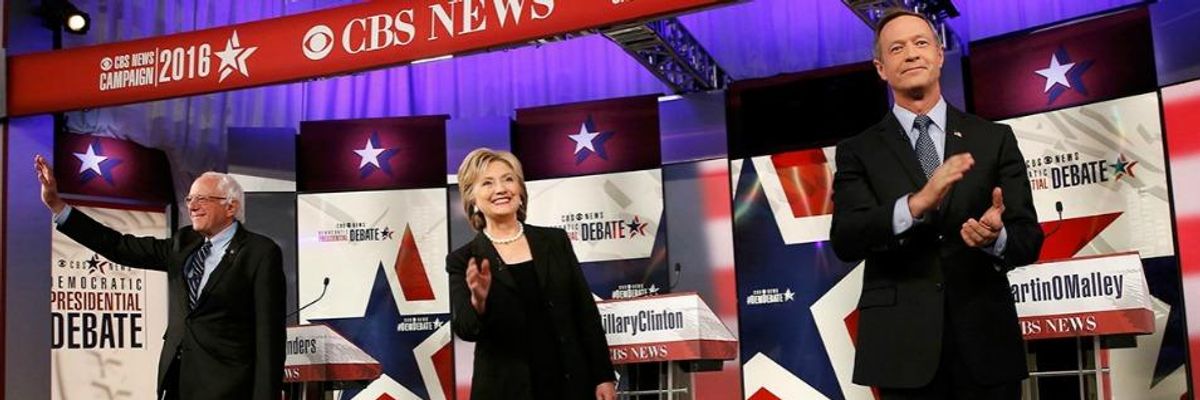The record low viewership of Saturday's Democratic debate has voters, particularly Bernie Sanders supporters, once again castigating the Democratic National Committee (DNC) for what many believe is a blatant attempt to shield establishment candidate Hillary Clinton and, in turn, relinquish important political ground to the Republican candidates.
Saturday night's CBS debate drew an audience of just 8.5 million viewers, 7 million less than the first Democratic debate last month, making it the lowest-rated primary debate this campaign season from either party, according to Nielsen ratings.
Given that Saturday's are known for having the lowest weekly TV ratings--particularly among people 18-35 years old, a key Democratic voting bloc--the DNC is facing renewed criticism for its debate schedule, which critics say is a clear attempt to protect the Democratic frontrunner.
"Look, there was a clear intent to bury these debates to the benefit of Clinton," a Democratic campaign official toldPolitico on Sunday. "And it is doing a disservice to the Democratic Party. The GOP is blowing out numbers--and we are protecting Hillary Clinton."
In comparison, the last two Republican debates, which were held on smaller networks than CBS, saw over 13 million viewers. Meanwhile, the first two, hosted by CNN and Fox News respectively, each broke 20 million.
What's more, the next two debates are also scheduled for potentially low-viewership weekends: the Saturday night before Christmas, and the Sunday night of the Martin Luther King Day weekend, during the National Football League playoffs.
"It's not rocket science to schedule debates on incredibly inconvenient dates," writes Vox's Alvin Chang, whose analysis of television viewership and debate schedules of past elections found that the DNC's weekend-heavy debate agenda seems particularly tailored to minimize viewership.
DNC Chair Debbie Wasserman Schultz has been under fire since the primary schedule, which consists of just six debates, was first unveiled.
And now that millions more are tuning in to hear the Republican candidates' biased take on everything from foreign policy to immigration to reproductive rights, voters and those interested in an alternative point of view are declaring "WTF?"
"It is, frankly, bullshit that this debate [...] was on a Saturday night and is likely to have enjoyed an audience in the high dozens," writes New York Magazine's Rebecca Traister. "These are politicians who are speaking nimbly about minimum-wage hikes, systemic racism, and financial reforms (finally, after years of these topics going unaddressed). Yet, they're being hidden under every kind of bushel."
Huffington Post contributor Miles Mogulesco agreed, saying, "There's no rational explanation except that the DNC wants as few people as possible to tune in to the Democratic debates, despite the fact that Presidential debates are one of the best ways to get a party's message out to large numbers of voters at once."
He continues: "Anything that allows Democratic primary voters to get to know Bernie Sanders (or Martin O'Malley) better makes it more likely that more voters will decide they like them, and maybe even prefer them to Hillary. It's amply clear that the DNC and the Clinton campaign have decided to avoid this at all costs, even if it means harming the Democrats' chance in the general election."
According to social media engagement metrics, Sen. Bernie Sanders was declared the winner of Saturday's debate.

